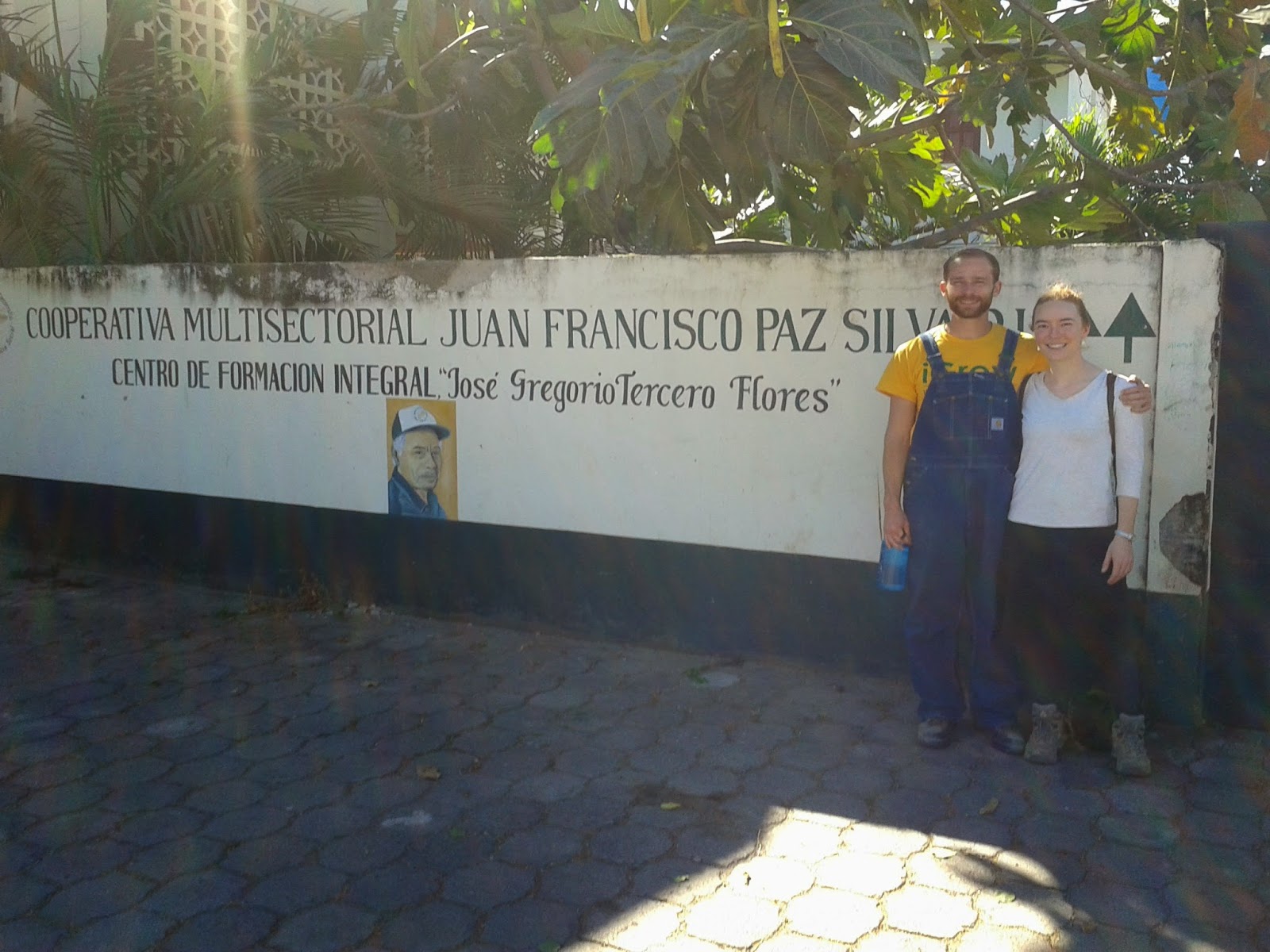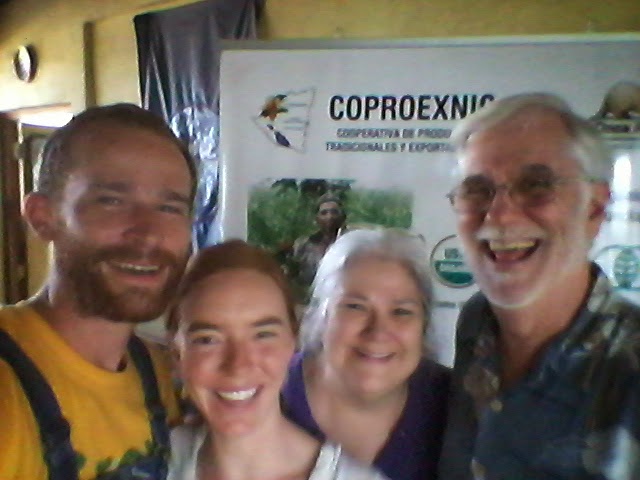If you need a food garden consult, compost delivery, garden design, or a couple raised beds, let me know. Send me an email with subject line "Food Gardening Work" or ring me at 322.0749, and I'll get right back with you.
- - -
In addition to the household-level food economy smarts of folks in Nicaragua, we also learned of many organized efforts to "alimentar" their communities, i.e., to ensure their communities are taken care of and are eating well. The good food movement, indeed, has many expressions!
Take the the spanish language school, Hijos del Maiz in el Lagartillo where we studied for example. On the surface, it is simply a community-based language school for teaching foreigners Spanish. Dig a little deeper, and you'll discover Hijos is a community-led economic development initiative that provides incomes for young people in the community, so they don't have to emigrate to survive, to feed their families. (The economic pressure to emigrate is the net-result of the 10-year U.S. backed and funded contra (revolutionary) war, which cost many in the community their loved ones and the U.S. political take-over of the 90s that dismantled and/or undermined small-farmer cooperatives including the one that originally drew the families of Lagartillo together. In light of these two events, most rural farming communities still struggle to make ends meet and feed their kids.) So, Hijos del Maiz is a spanish language school that provides economic opportunity to community families.
But, dig a step deeper still, and you'll learn that the purpose of the school had always been to nourish the families-- directly. Let me explain.
Everyone from the community involved in the spanish school receives payment: teachers, home-stay families, coordinators, and the bookkeeper. (As an aside, 20% of revenue is placed in a "social projects" account for "betterment" projects like family latrines, a community center & library, medical assistance and scholarships.) The hope in paying home stay families was that they could afford to purchase healthier food options, namely fruits and vegetables. After a while, leadership noticed that though incomes had increased, diets had not changed, so they changed the payment structure.
From then on, families were paid partially in cash and partially with a large baskets full of fresh fruits and vegetables. Additionally Hijos hosted cooking classes to teach families about non-traditional foods like beets. The president of Hijos told me, "Nathan, you wouldn't know because you haven't been here for the last decade, but the difference is profound. The children in our community have rosy cheeks these days." Rosy cheeks. How's that for a measure of impact?
From then on, families were paid partially in cash and partially with a large baskets full of fresh fruits and vegetables. Additionally Hijos hosted cooking classes to teach families about non-traditional foods like beets. The president of Hijos told me, "Nathan, you wouldn't know because you haven't been here for the last decade, but the difference is profound. The children in our community have rosy cheeks these days." Rosy cheeks. How's that for a measure of impact?
- - -
We visited two other remarkable organized efforts in Nicaragua tied to food: the Juan Francisco Paz Silva Cooperative and the Center for Development in Central America. Both impressed us outright and reminded us of the work being done in the north Florida region by Tallahassee Food Network, Red Hills Small Farms Alliance, Seed Time Harvest, and FAMU Small Farm's Program.
 The primary product of Juan Francisco Paz Silva Cooperative in Achuapa is sesame: raw, roasted, oil, tahini and snack bars. They also aggregate and sell hibiscus wine and honey. Currently in R&D, they are experimenting with rock-powers and soil bio-enhancers akin to EM (effective microorganisms) as soil amendments for their farmers to increase yields without synthetic chemicals, which poison fields and farmers. They do farmer workshops, provide extension-like services, and maintain a retail-store for farm and family basics. They also have a women's wealth-creation program and leadership development programs for youth. Their 200+ farmers make decisions by representation: all farmers are organized into groups of 5; each group choses their delegate to attend the annual meeting.
The primary product of Juan Francisco Paz Silva Cooperative in Achuapa is sesame: raw, roasted, oil, tahini and snack bars. They also aggregate and sell hibiscus wine and honey. Currently in R&D, they are experimenting with rock-powers and soil bio-enhancers akin to EM (effective microorganisms) as soil amendments for their farmers to increase yields without synthetic chemicals, which poison fields and farmers. They do farmer workshops, provide extension-like services, and maintain a retail-store for farm and family basics. They also have a women's wealth-creation program and leadership development programs for youth. Their 200+ farmers make decisions by representation: all farmers are organized into groups of 5; each group choses their delegate to attend the annual meeting.- - -
We visited with Kathleen Murdock and Mike Woodward at the Center for Development in Central America (CDCA) in Ciudad Sandino. At the prompting of priest Miguel Descoto, they relocated their Jubilee House Community to Nicaragua in the 90s. For the past 20 years, they have been working with their Nicaraguan neighbors in the areas of sustainable agriculture, sustainable economic development, health, education, and appropriate technology. In their words, their goal is to work in partnership with communities and cooperatives to facilitate empowerment: enabling them to find their own solutions to the problems they identify and connecting them with resources to solve their problems. The mission is to enable communities to become self-sufficient, sustainable, democratic entities. They have helped start 14 coops across the country (including a number of farming coops that are USDA certified organic.) Mike and Kathleen also gave us an update on how the coup in Honduras has led to "open season" on La Via Campesina, their leaders and their peasant (i.e. small) farmer members. Click the links to learn more.
 Next up: stories from our time in Ecuador.
Next up: stories from our time in Ecuador.Happy Spring!
And, come to Gramling's Centennial Celebration on Saturday! See you there,
Nathan, MIO



